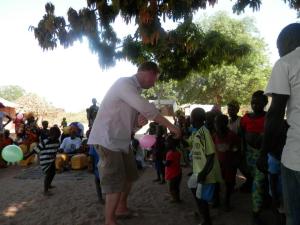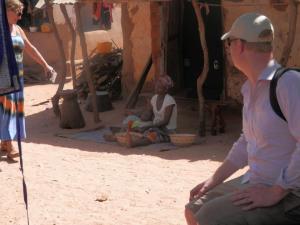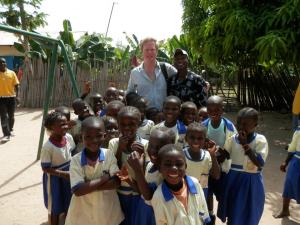Steven George-Hilley on Gambia aid and international development
Leave a commentFebruary 27, 2016 by Author
The Africa Accelerate Project has recently sent its director Steven George-Hilley to The Gambia to support and learn more about a hidden network of people who met, kept in touch and delivered aid through social media channels.
The Gambia is one of Africa’s smallest and poorest countries, ranking 168th out of 187 countries in the UN Programme’s human development index. Poverty is endemic, and predominantly rural meaning many families go without food or water for months. Approximately three quarters of the rural population is classified as poor or in poverty.

Village life
Over 60 per cent of all Gambians and an even higher proportion among poor and extremely poor people rely on agriculture and farming for their livelihood. At least 50 per cent of the country’s poor population is composed of farmers and agricultural workers.
These include Groundnut farmers in upland areas are among the poorest. In the North Bank, Upper River and Lower River regions, over two thirds of the population is poor – though pockets of poverty can be found throughout the country in different areas.
He says, “It’s not enough to simply provide aid work in the developing world, we have to ensure the right systems are in place for sustainability and longevity of economic opportunity. With this in mind, technology can help transform lives in some Africa’s most challenged areas.
He continues, “We all know that the variety of social media tools has helped connect millions of people all over the world through devices like mobiles, allowing users to interact seamlessly at the touch of the button.
Some of the most prominent campaigns have been fuelled by social media, to the extent that campaigns are now regularly front-loaded for social media. But these networks, which can be found in the most surprising places, also provide untold support to smaller charities, which have found a new way to thrive in difficult financial circumstances.
Women in The Gambia are the majority of the population in rural areas. Compared with men, they face a higher incidence and greater severity of poverty, with starvation a common factor.
Yet women account for over half of the agricultural labour force and 70 per cent of unskilled labourers, and they produce about 40 per cent of total agricultural output.
In particular, rice farming in both upland and lowland areas is largely done by women, but productivity is low because of the rudimentary technologies and practices used.
“The true value of the impact social media has on fundraising projects was demonstrated to me in The Gambia where I was working with the Glove Project, an organisation which works to improve local villages through a mixture of aid and enterprise.
“It’s impressive. But what’s most surprising about this initiative is the way it recruits volunteers through social media.
“Many of the volunteers who visited the village on my trip had met or heard about the project and its action team through the Trip Advisor travel forum. Interestingly, several of the people who attended the project were originally searching the forum for travel advice and tourist tips, when they stumbled across Gambia’s hidden army of voluntary aid workers and decided to get involved.
Every year, poor households in rural areas face the ‘hungry season,’ a period of over four months at the peak of the rains between July and September, when household food stocks are low or depleted leaving many families without food or necessary resources.
To cover their needs in this environment, many households depend on income generated by groundnuts and other cash crops, or on remittances.

A young woman sells peanuts
“Despite the poverty the explosion of mobile devices and connectivity across Africa means that more and more people are able to connect, communicate and coordinate aid projects in countries like The Gambia from the source around the world to improve lives,” he says.
“Despite a lack of resources and millionaire backers, people working in even the most remote areas can support their own development directly,” he concludes.
Once a central online social portal for tourists doing their homework ahead of a much deserved holiday, online forums such as Trip Advisor now serve as a platform for connecting the new generation of aid workers.
Online experiences are unlocking the inner, often undiscovered philanthropists of tomorrow, by inspiring and encouraging more people into aid work.
This means that through technology, parts of the developing world can look forward to a brighter future in the long term.
Recommendations for improving aid relief in The Gambia:
- International Development funding for crowd sourced aid projects
- Combining holidays and tourism with aid education and poverty awareness
- Engaging advocates, donors and supporters via social media channels
- Using mobile payments and online apps to encourage micro-donations and expressions of support
- Using digital media to promote awareness of poverty in the developing world

